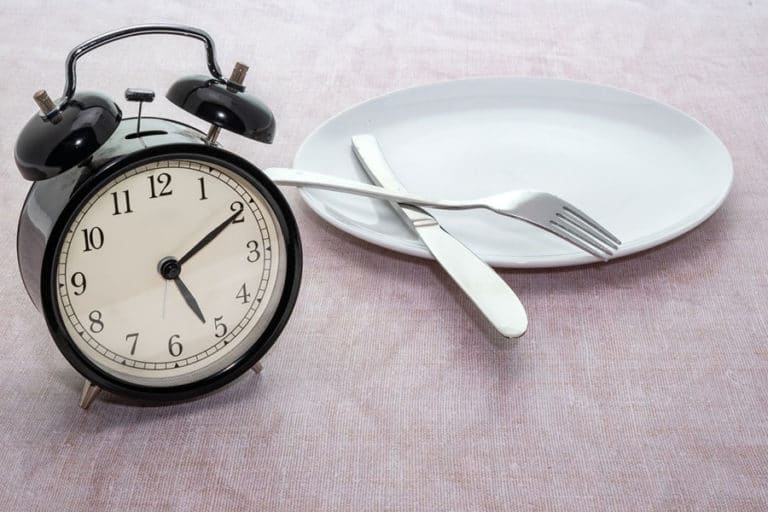12 Incredible Benefits of 24-Hour Fast Once a Week

Benefits | Body Behavior on 24-hour fast | Tips to follow | Tips to break your fast | FAQs
Dieting and fasting are some of the most common ways for people to achieve their weight loss goals.
It has been observed that 36% of Americans follow a specific diet, and the top eating pattern (at 10%) is intermittent fasting.
People are increasingly pursuing the 24-hour intermittent fasting route. The benefits of a 24-hour fast once a week range from weight loss and blood sugar management to better immunity and brain function.
12 amazing benefits of 24-hour fast once a week
It is a general notion that fasting may cause several health risks. However, experts now believe one can easily fast for 24 hours and reap several benefits. Below are the benefits of fasting for 24 hours:
1. Helps you lose weight
One of the major benefits of fasting for 24 hours once a week is weight loss. Fasts reduce weekly calorie consumption and eventually help achieve weight loss.
Research [1]National Library of Medicine: Intermittent fasting: the science of going without says taking periodic breaks from eating for up to 24 hours once or twice a week is an effective way of losing weight and improving general health.
Fasting induces a calorie deficit that forces the body to burn stored fat for energy, leading to a steady body fat loss.
2. Better metabolic health
Fasting for 24 hours has been shown to lead to better metabolic health. When fasting, the body is forced to burn stored body fat for energy, which leads to a decrease in insulin levels and an elevation of growth hormone levels. This enhances hormone function and boosts the metabolism, making it easier to lose weight and keep it off.
3. Helps to manage blood sugar levels
Practicing calorie restriction for 24 hours once a week could be useful for people who are at a high risk of diabetes.
Studies [2]National Library of Medicine: Effects of intermittent fasting on health markers in those with type 2 diabetes: A pilot study have shown that short-term fasting significantly decreases blood sugar levels by reducing insulin resistance. Time-bound calorie restriction can result in increased insulin sensitivity.
However, fasting may impact the blood sugar levels of men and women differently. So, it’s better to seek an opinion from a healthcare provider and check your insulin levels before opting for 24-hour fasting.
4. Develops muscles
A 24-hour fast once a week also entails muscle growth and development. This happens because fasting encourages the production of growth hormone (HGH) that aids muscle mass development.
Several studies have indicated that fasting leads to natural growth hormone secretion. Plus, fasting reduces insulin resistance and ensures low blood sugar levels, which further optimizes HGH levels.
5. Strengthens the immune system
Surprising as it may sound, fasting for 24 hours a week might actually help to strengthen the immune system rather than weaken it.
When the body is deprived of food, it goes into a state of repair and regeneration. This is an evolutionary response to the lack of food. It helps to improve tissue immunity.
These benefits can help to boost the immune system and enhance the body’s ability to fight illness and infections.
6. Fights inflammation
It is a widely accepted fact that chronic inflammation can lead to multiple health conditions, such as cancer, hypertension, and cardiovascular disease.
Scientific research and a few animal studies have found that fasting reduces inflammation and may help treat certain chronic inflammation-related diseases like multiple sclerosis or neurological disorders like Alzheimer’s.
7. Helps prevent cardiovascular diseases
When it comes to one-day fasting benefits, we can’t miss talking about cardiovascular diseases. Fasting for 24 hours reduces cholesterol levels and stress on the blood vessels and heart and lowers the trimethylamine N-oxide levels linked to coronary artery disease.
8. Reduces blood pressure
The health benefits of fasting don’t end here! The benefits of a 24-hour fast once a week also include improved blood pressure. Fasting can help reduce blood pressure if it’s high and eventually lower the risk of heart disease.
9. Boosts brain function
There are studies [3]PubMed: Chronic intermittent fasting improves cognitive functions and brain structures in mice that show that fasting boosts brain function and reduces the risks of certain neurodegenerative disorders, such as Alzheimer’s disease. However, the research is limited to animal research, and the reasons behind the increased brain activity remain unclear to date.
10. May prevent cancer
One of the biggest benefits of a 24-hour fast once a week is that fasting may aid in cancer prevention and even increase the efficacy of chemotherapy drugs.
Cancer is the second leading cause of death in the USA. According to research [4]National Library of Medicine: Fasting and Caloric Restriction in Cancer Prevention and Treatment, caloric restriction through fasting can help prevent and treat it.
Here again, the research is limited to animal studies. So, additional studies are required to deduce how fasting influences cancer prevention and treatment in humans.
11. Can extend longevity
A study put together by researchers at Harvard T.H. Chan School of Public Health indicates that dietary restrictions from time to time slow down the aging process and allow one to live longer. This happens due to the reinvigoration of cells that promote healthy aging.
12. Stimulates Autophagy
Autophagy [5]Cleveland Clinic: Autophagy is a natural process that allows your body to break down and reuse old cell parts, promoting more efficient cellular function. This process is essential for balancing energy sources during critical developmental times and in response to nutrient stress.
Fasting can induce autophagy by depriving the body of nutrients, forcing it to repurpose cell components to function effectively.
When you fast, your body experiences a decrease in insulin levels, which triggers a cascade of cellular responses, including autophagy. This allows the cells to efficiently clear out waste and optimize their functioning.
What happens to your body when you fast for 24 hours?
When one is not fasting, the body uses energy from glucose, which is released into the bloodstream by the liver and muscles. During fasting, after about 8 hours, the liver will use the last glucose reserves. At this point, the body will transition into fasting mode; a state called gluconeogenesis.
During this stage, the body will create its own glucose using fat stores since it is receiving no carbohydrates. After all the glucose stores are used up, fasting mode turns to starvation mode. At this point, metabolism declines, and the body starts breaking down muscle tissues to utilize protein to produce energy.
So, it is generally safe to fast for 24 hours and break it after that. Do not opt for a prolonged fast if you have health conditions.
Tips For Successful 24-Hour Fasting
A 24 hour fast benefits the human body in several ways. It cleanses the organs, reduces inflammation, aids in weight loss, and prevents several chronic health problems.
However, it is not easy for every individual to fast for 24 hours a day. We have put together some tricks and hacks to help you survive the fast.
To reap the health benefits of a 24-hour fast once a week, follow these tips:
1. Eat a big meal the day before fasting
Eat a big and satisfying meal the day before taking up fasting. Instead of consuming fewer calories, increase your calorie intake through healthy foods, such as whole grains, lean proteins, fruits, and veggies. Nourish your body with all the essential macronutrients and micronutrients a day before your 24-hour fast.
2. Plan ahead of time
Plan what you are going to do with your body ahead of time. Do not wait for the fast to end; prepare your first or next meal in advance.
Consider something high in protein and healthy fats, such as protein bars, eggs, nuts, seeds, peanut butter, and even bananas.
3. Take the last meal early in the day
If you take your last meal early in the day, you can easily make it through the fasting period without feeling hungry. You can sleep through most of the fast and wake up feeling refreshed.
4. Stay hydrated
Drink plenty of water always, especially a day before your fast to have a positive fasting experience. You can also try to incorporate other healthy drinks like green tea, buttermilk, fruit juices, and so on to keep yourself hydrated through your fasting period.
5. Do not do intense workouts
You may take up gentle physical activity during your fasting period but refrain from doing intense workouts. Heavy workouts will drain all your energy quickly, and eventually, you may end up giving up fasting.
How to break your 24-hour fast?
If you fast for 24 hours, make sure you eat right once you break your fast. Eating nutrient-dense food is mandatory after the fasting period. Avoid foods that are unhealthy or processed and high in sugar or sodium. Follow these tips to break your 24-hour fast successfully:
- Avoid processed foods, such as chips, pizzas, burgers, cakes, cookies, etc.
- Drink plenty of water, especially if you haven’t had any liquids during the fast.
- Eat healthier foods such as vegetable salads, meat, fish, and soups.
- Use healthy dressings made using avocado oil, apple cider vinegar, and lime if you plan to eat salads.
- Chew your food well and eat it without distractions.
- Do not try new foods immediately after your fast. Eat what your body is familiar with.
- Consider consuming bone broth since it is full of electrolytes, easily digestible, and contains healthy fats.
- Snack on nuts and seeds after your fasting period. Alternatively, rely on a protein bar that has no added sugar.
Conclusion
Fasting offers several health benefits. Physically speaking, it is quite safe and easy to go on a 24-hour fast. However, avoid fasting if you have any pre-existing health problems. In such a case, it’s wise to seek your doctor’s help before you opt for fasting.
FAQs
Here are a few frequently asked questions about 24-hour fasting and its expected outcomes:
What can you have during a 24 hour fast?
During a 24-hour fast, you should only consume water, black coffee, or unsweetened tea. These beverages are allowed as they do not contain any calories or macronutrients that could disrupt the fasting state.
Will I lose weight if I fast for 24 hours once a week?
Fasting for 24 hours once a week may result in short-term weight loss due to reduced calorie intake. However, sustained weight loss depends on various factors such as overall diet, exercise, and lifestyle. It’s important to remember that weight loss should be approached holistically and not solely reliant on one-time fasting.
How many calories are burned while fasting for 24 hours?
According to a study published in the American Journal of Clinical Nutrition, short-term fasting for 24 hours can increase the metabolic rate by approximately 3.6-14 percent, which translates to an estimated increase of nearly 100-275 calories burned during the fasting period.
References
| ↑1 | National Library of Medicine: Intermittent fasting: the science of going without |
|---|---|
| ↑2 | National Library of Medicine: Effects of intermittent fasting on health markers in those with type 2 diabetes: A pilot study |
| ↑3 | PubMed: Chronic intermittent fasting improves cognitive functions and brain structures in mice |
| ↑4 | National Library of Medicine: Fasting and Caloric Restriction in Cancer Prevention and Treatment |
| ↑5 | Cleveland Clinic: Autophagy |







